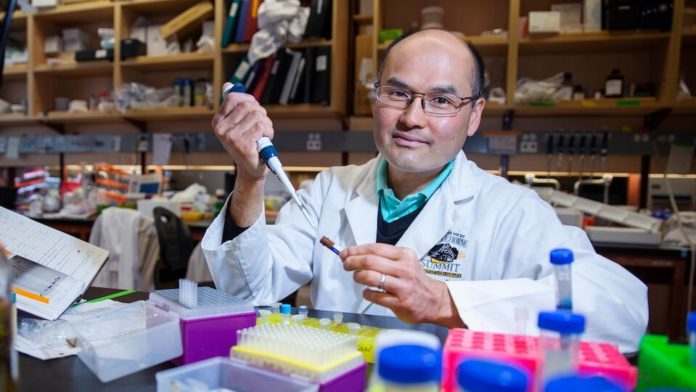Immunologist Julian Lum has been awarded a $1.08 million grant to further study the relationship between cancer, our diet, and immune cells.
Lum, a University of Victoria researcher and scientist with the BC Cancer Agency, is currently exploring the link between nutrition and immune cell function in hopes of expanding the scope and efficacy of Chimeric Antigen Receptor (CAR) T-therapy. His approach factors in a cancer patient’s diet with the aim of improving the CAR T-cells’ ability to fight cancer cells.
Immune cells (T-cells) play a vital role in our system by managing our immune response and eliminating cells infected by pathogens. Unmodified T-cells can fight cancer, but they often have trouble identifying cancer cells. In the usual course of CAR T-therapy, T-cells are extracted from a patient’s blood and then genetically engineered to produce chimeric antigen receptors. Following the artificial multiplication of their numbers in the lab, the T-cells — which can now identify and attack cancer cells courtesy of their specialized receptors — are reinfused into the patient’s body.
CAR T-therapy has already shown a lot of promise with blood cancers like leukemia and lymphoma. James Kochenderfer, a US researcher and lead investigator in a separate trial, believes that “CAR T-cells are almost certain to become a frequently-used therapy for several types of lymphoma.”
Unfortunately, the same can not yet be said for solid tumours like colorectal or breast cancer, and this is where Lum hopes to make his mark.
T-cells and cancer cells are, according to Lum, in a “constant nutritional arms race for glucose.” By reconfiguring the dietary playing field, Lum’s team believe they can help T-cells come out on top.
“We are the only academic team in Canada approaching the problem by studying this nutritional arms race to make CAR T-cells more nutritionally fit, thus tipping the balance of power away from the cancer cells and in the favour of immune cells,” says Lum.
Interest in CAR T-therapy has exploded and the number of ongoing clinical trials is now over 180 compared to a select few less than a decade ago. Progress is arriving quickly as well — a notable recent study from the University of Southern California has shown promise with mitigating some of the severe side effects of the treatment, which can be life-threatening.
Cancer rates have been on the rise over the last century, and although many factors like longer lives and alcohol and tobacco consumption are involved, our diets are also hugely important. Lum’s ultimate aim is to advance CAR T-therapy to the point of being a highly personalized treatment that accounts for an individual’s genes.








































